Support justice-driven, accurate and transparent news — make a quick donation to Truthout today!
The government of Uruguay, South America’s second smallest nation with only 3.4 million people, has the world’s toughest laws mandating graphic health warnings on cigarette packages. Phillip Morris, which makes Marlboro, the world’s best selling and most valuable cigarette brand, has sued Uruguay in a World Bank trade tribunal, not only to overturn the nation’s labeling law, but to seek $25 million in damages to their “brand,” which they describe as their most valuable asset.
This is an expensive lawsuit that is not easy for Uruguay to fight. Phillip Morris has annual revenues greater than Uruguay’s entire GDP – $80 billion vs. $59 billion. Truthout covered the story in depth in a December report that traces the origins of the litigation and details the new transnational legal system being exploited by Phillip Morris. The Truthout story was translated to Spanish by Uruguayan journalist Martín Otheguy and republished February, 2015 by popular Uruguayan news site Montevideo Portal.
In the latest twist in this story, the Uruguayan National Ministry of Public Health (MSP, Ministerio de Salud Pública) published new, more stringent requirements for health warnings on cigarette packages during the last week of February. Martín has shared the first photos of the new labels with Truthout. There are six extremely very graphic images (below) with the following text:
Spanish: “Tu peor enemigo es el cigarrillo. Dejá de fumar.”
English: “Your worst enemy is the cigarette. Stop smoking.”
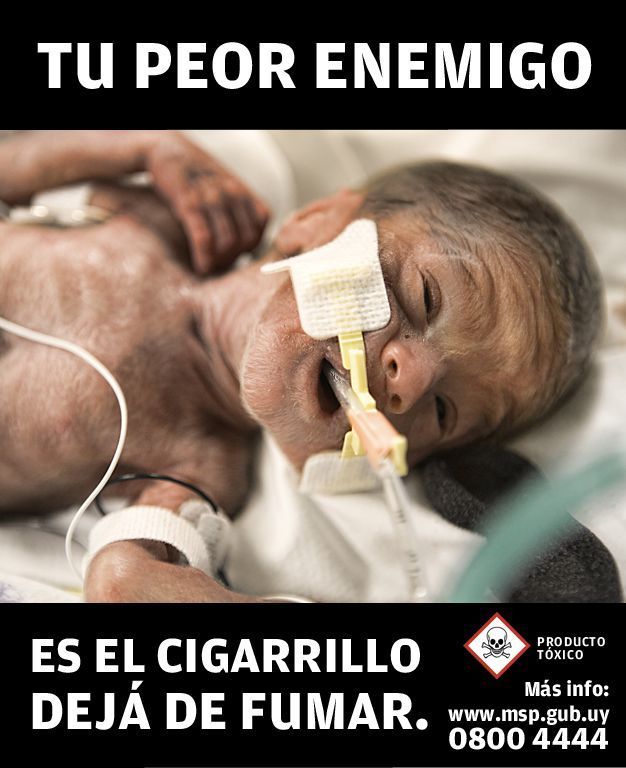 Infant cancer. (Image: MSP, Ministerio de Salud Pública)
Infant cancer. (Image: MSP, Ministerio de Salud Pública)
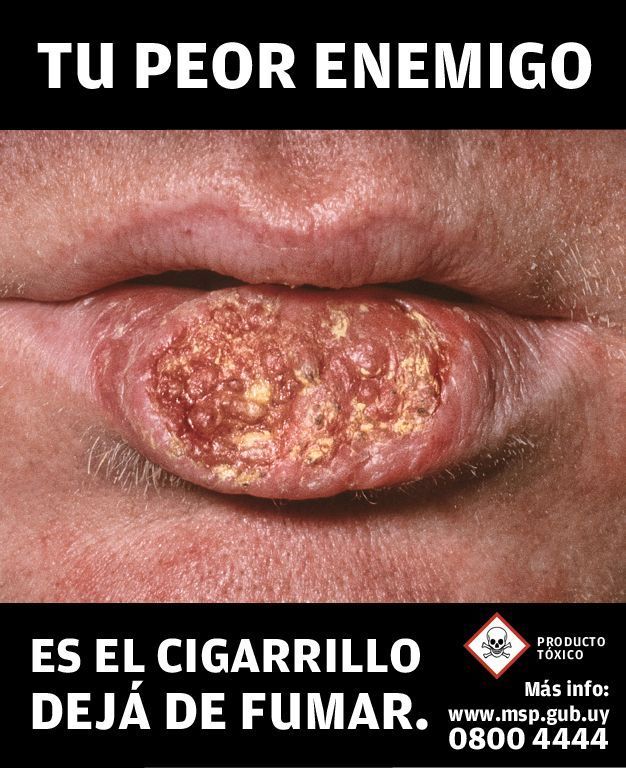 (Image: MSP, Ministerio de Salud Pública)
(Image: MSP, Ministerio de Salud Pública)
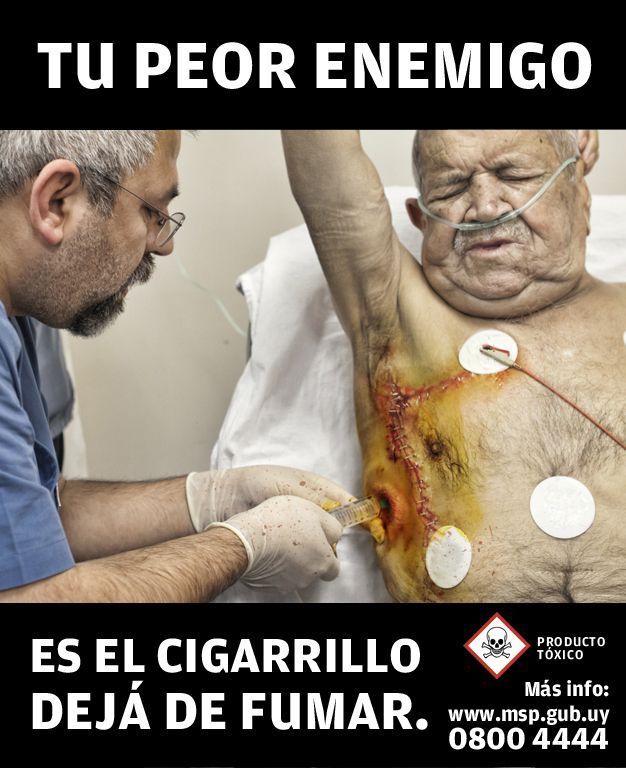 (Image: MSP, Ministerio de Salud Pública)
(Image: MSP, Ministerio de Salud Pública)
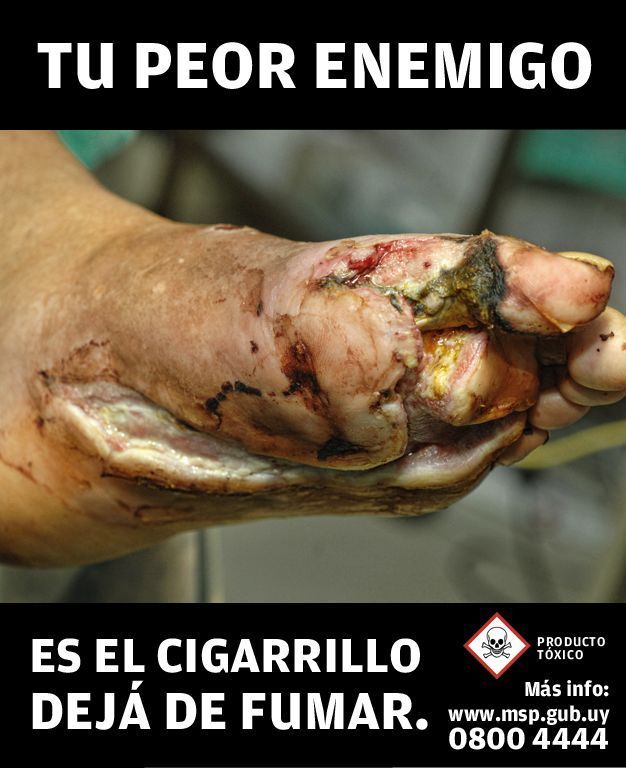 (Image: MSP, Ministerio de Salud Pública)
(Image: MSP, Ministerio de Salud Pública)
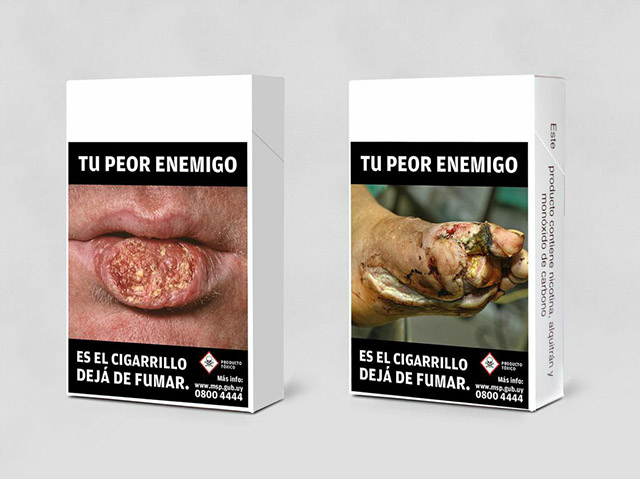 (Image: MSP, Ministerio de Salud Pública)
(Image: MSP, Ministerio de Salud Pública)
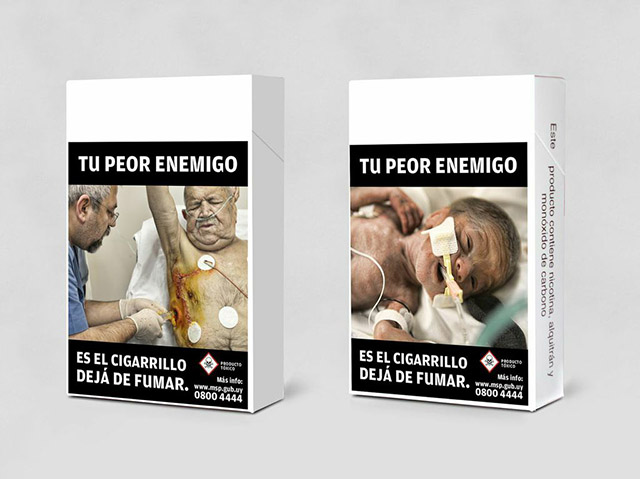 (Image: MSP, Ministerio de Salud Pública)
(Image: MSP, Ministerio de Salud Pública)
For any politician or activist looking for a courageous example of how to fight back against the bullying and intimidation of transnational drug cartels such as Phillip Morris, Uruguay is at the top of the list. Nor is Uruguay likely to back down in the face of the Phillip Morris lawsuit. On March 1, 2015, President Tabaré Vazquéz was sworn in for a second five-year term. Vazquéz is also a Doctor of Oncology who has stated that, “Uruguay is not afraid of Phillip Morris.”
Martín reports from Montevideo that during his new term as president, Vazquéz plans to battle alcohol the same way Uruguay is battling cigarettes. While details of the new alcohol regulation plan have not been published, speculation centers on the probability of an approach similar to tobacco regulation, with emphasis on controlling publicity and raising taxes, with a likely focus on hard liquor. In an official statement on his second-term priorities, President Vázquez issued an official statement that said:
Regarding this last subject [alcohol regulation], we plan to take similar measures, very strong measures, like the ones we developed to battle tobacco”
These assertions of sovereign power to protect public health against the heedless profiteering of multinational corporations offer a heartening example of strong national leadership in an era of corporate and financial globalization. This kind of leadership is needed now more than ever to fight the antidemocratic bias of an encroaching transnational legal and financial system that is set up and run by and for global corporations and banks, not the people.
Trump is silencing political dissent. We appeal for your support.
Progressive nonprofits are the latest target caught in Trump’s crosshairs. With the aim of eliminating political opposition, Trump and his sycophants are working to curb government funding, constrain private foundations, and even cut tax-exempt status from organizations he dislikes.
We’re concerned, because Truthout is not immune to such bad-faith attacks.
We can only resist Trump’s attacks by cultivating a strong base of support. The right-wing mediasphere is funded comfortably by billionaire owners and venture capitalist philanthropists. At Truthout, we have you.
Our fundraising campaign is over, but we fell a bit short and still need your help. Please take a meaningful action in the fight against authoritarianism: make a one-time or monthly donation to Truthout. If you have the means, please dig deep.
